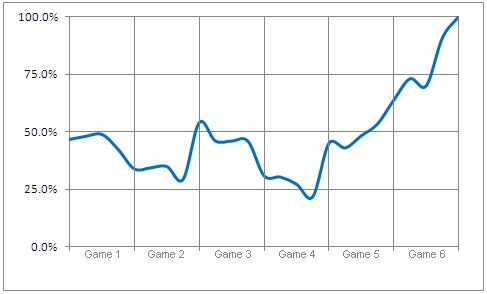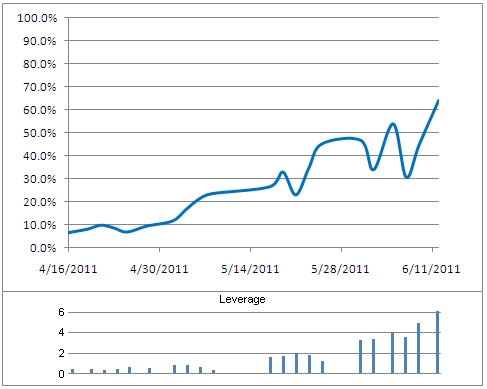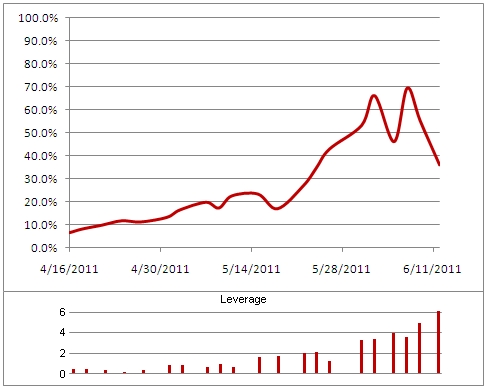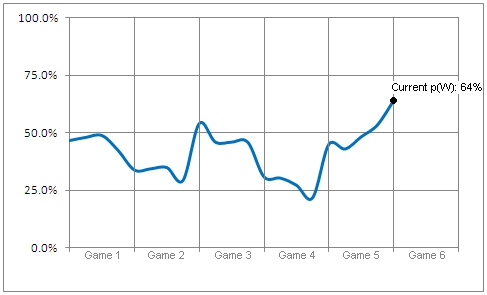30th June 2011
One of my favorite quotes from Jonah Lehrer's oft-ripped Grantland piece was this:
"By nearly every statistical measure, the Mavs were outmanned by most of their playoff opponents. (According to one statistical analysis, the Los Angeles Lakers had four of the top five players in the series. The Miami Heat had three of the top four.) And yet, the Mavs managed to do what the best teams always do: They became more than the sum of their parts. They beat the talent."
Yep, because the stats guys were the only ones who didn't predict the playoffs with perfect accuracy:
ESPN National Expert Picks vs. Simple Rating System (no HCA), 2011 Playoffs:
| Round |
Team A |
Team B |
Winner |
Adande |
Broussard |
Ford |
Legler |
Sheridan |
Stein |
Wilbon |
SRS |
| 1 |
IND |
CHI |
CHI |
1 |
1 |
1 |
1 |
1 |
1 |
1 |
1 |
| 1 |
PHI |
MIA |
MIA |
1 |
1 |
1 |
1 |
1 |
1 |
1 |
1 |
| 1 |
NYK |
BOS |
BOS |
1 |
1 |
1 |
1 |
1 |
1 |
1 |
1 |
| 1 |
ATL |
ORL |
ATL |
0 |
0 |
0 |
0 |
0 |
0 |
0 |
0 |
| 1 |
MEM |
SAS |
MEM |
0 |
0 |
0 |
0 |
0 |
0 |
0 |
0 |
| 1 |
NOR |
LAL |
LAL |
1 |
1 |
1 |
1 |
1 |
1 |
1 |
1 |
| 1 |
POR |
DAL |
DAL |
1 |
1 |
0 |
0 |
0 |
1 |
0 |
1 |
| 1 |
DEN |
OKC |
OKC |
1 |
1 |
1 |
1 |
1 |
0 |
1 |
0 |
| 2 |
BOS |
MIA |
MIA |
1 |
1 |
1 |
0 |
0 |
0 |
|
1 |
| 2 |
ATL |
CHI |
CHI |
1 |
1 |
1 |
1 |
1 |
1 |
1 |
1 |
| 2 |
DAL |
LAL |
DAL |
0 |
0 |
0 |
0 |
0 |
0 |
0 |
0 |
| 2 |
MEM |
OKC |
OKC |
1 |
1 |
1 |
1 |
1 |
1 |
1 |
1 |
| 3 |
MIA |
CHI |
MIA |
1 |
1 |
0 |
1 |
1 |
1 |
0 |
1 |
| 3 |
OKC |
DAL |
DAL |
1 |
1 |
0 |
0 |
0 |
1 |
1 |
1 |
| 4 |
DAL |
MIA |
DAL |
1 |
0 |
0 |
0 |
1 |
1 |
0 |
0 |
ESPN Experts: 63.5%
SRS: 66.7%
I'm not doing this to pick on ESPN's national NBA experts, by the way. It's just my way of showing that nobody predicted the playoffs very well, and nobody saw Dallas going as far as they did. Nobody. For Jonah Lehrer to act as though statheads were the only ones who failed to see the potential for Dallas to upset L.A. and then win 4 games in a 6-game sample against the Heat is beyond absurd. (But you probably already knew that, because you've read the 600 other takedowns of Lehrer's article.)
The point: when it comes to the unpredictability of sports making them look silly, computers hardly have the market cornered.
Posted in Playoffs, Rants & Ramblings | 38 Comments »
27th June 2011
BBR user Kenneth asked:
"I have a question regarding players and coaches with NBA titles--which player(s) and coach(es) have won NBA titles with the most teams? As for players, I suspect Robert Horry, who won titles with the Houston Rockets (2), Los Angeles Lakers (3), and San Antonio Spurs (2), unless another player has won titles with four teams."
Right you are, Kenneth (although, like many people, you forgot about John Salley). Here are all the players and coaches who won championships in the same role with multiple teams:
Read the rest of this entry »
Posted in BBR Mailbag, History, Playoffs, Trivia | 32 Comments »
16th June 2011
Here's a great piece about Dirk Nowitzki from Deadspin's Luke O'Brien, wherein he examines the media narrative about Dirk's "soft" game. Although we were told that Dirk had acquired a tougher style of play, is that really even true?
"Instead of everyone casting about for ways to explain Nowitzki's transformation now that he has a ring, we should celebrate the fact that he hasn't transformed at all. In being exactly who he's always been, he defies the silly notion in American sports that an athlete has to don armor, psychic or otherwise, to win a title. Nowitzki has never been the guy who screams into the upper decks like a maniac after each and-one. He's never tried to be. He's one of the best low post scorers in the NBA, but you'd never know it because he doesn't play with his back to the basket like other seven-footers. Instead of dunking opponents through the rim, he's mastered a step-back shimmy to get off a soft jumper that nobody can defend and that often leads to a free throw that almost always goes in. Softly. Nowitzki doesn't charge into battle. He fades away. And he wins because of it, not despite it."
As O'Brien notes, real courage comes in sticking with an unconventional style despite high-profile failures and media criticism. Dirk's conviction in his own "soft" style eventually vindicated it, and in a perfect world the media would admit they were wrong instead of inventing a false narrative about how Dirk changed at their behest.
Posted in Layups, Playoffs | 153 Comments »
13th June 2011
Have Mavericks found a recipe to defend LeBron?: From Weak Side Awareness -- Lost in all the analysis is the fact that Dallas seems to have figured out how to stop LeBron James.
Posted in Layups, Playoffs | 55 Comments »
12th June 2011
Dallas' Series Win Probability Graph after Game 6 (Dallas wins series 4-2):

Dallas' Quarter-by-Quarter Series Win Probability Data:
| Minutes Elapsed |
p(win) |
| 0 |
46.7% |
| Game 1 |
| 12 |
48.0% |
| 24 |
48.8% |
| 36 |
42.3% |
| 48 |
33.8% |
| Game 2 |
| 60 |
34.3% |
| 72 |
34.9% |
| 84 |
29.3% |
| 96 |
54.0% |
| Game 3 |
| 108 |
46.0% |
| 120 |
46.0% |
| 132 |
45.9% |
| 144 |
30.9% |
| Game 4 |
| 156 |
30.3% |
| 168 |
27.2% |
| 180 |
21.7% |
| 192 |
45.0% |
| Game 5 |
| 204 |
43.0% |
| 216 |
48.3% |
| 228 |
53.4% |
| 240 |
63.7% |
| Game 6 |
| 252 |
73.0% |
| 264 |
69.9% |
| 276 |
90.7% |
| 288 |
100.0% |
(For more info on the Series Win Probability methodology, click here)
Posted in Playoffs, Statgeekery | 101 Comments »
12th June 2011
Here are a couple of graphs showing the game-by-game progression of Dallas & Miami's championship probabilities as they moved through the playoffs:
Dallas Mavericks

Miami Heat

("Leverage" is the importance of the game relative to the average playoff game, which always has a leverage index of 1.00)
Posted in Graphs, Playoffs, Statgeekery | 6 Comments »
12th June 2011
As a follow-up to Thursday's post about the best Finals performances according to Statistical Plus/Minus, here's a playoff ranking since 2003 with a few tweaks:
- I finally re-ran the Offensive SPM formula without steals and blocks. Steals in particular were causing certain players to be extremely overvalued offensively, and there's little reason to include those defensive stats in an offensive regression. (DSPM is the same as before -- and yes, it still includes several offensive stats, but DSPM wouldn't explain more than 25% of defense without them, while OSPM's explanatory power was barely affected by dropping steals & blocks out.)
- At the request of readers, instead of per-minute SPM players are ranked by per-game "Impact", which is SPM times the % of team minutes played.
- All of a player's games are weighted by Championship Leverage, which takes into account how much the game will potentially swing the odds of a team winning the NBA title. Leverage is relative to the average playoff game in a given season (which always has a leverage index of 1.00). For instance, Game 1 of the Magic-Hawks 1st-round series had a leverage of 0.44, while Game 5 of the Finals had a leverage of 5.28. This means that, in terms of influence on championship probability, Thursday's game was 12 times as important as Game 1 of a 1st-round series, and the rankings will reflect this.
Finally, why 2003? Because that was the year the NBA adopted best-of-7 first-round series, allowing me to use the series win probabilities found here.
Anyway, here were the top playoff performers since 2003 according to per-game SPM impact, weighted by the importance of the game (minimum 10 games):
Read the rest of this entry »
Posted in Analysis, Playoffs, Statgeekery, Statistical +/- | 11 Comments »
9th June 2011
Dallas' Series Win Probability Graph after Game 5 (Dallas leads 3-2):

Dallas' Quarter-by-Quarter Series Win Probability Data:
| Minutes Elapsed |
p(win) |
| 0 |
46.7% |
| Game 1 |
| 12 |
48.0% |
| 24 |
48.8% |
| 36 |
42.3% |
| 48 |
33.8% |
| Game 2 |
| 60 |
34.3% |
| 72 |
34.9% |
| 84 |
29.3% |
| 96 |
54.0% |
| Game 3 |
| 108 |
46.0% |
| 120 |
46.0% |
| 132 |
45.9% |
| 144 |
30.9% |
| Game 4 |
| 156 |
30.3% |
| 168 |
27.2% |
| 180 |
21.7% |
| 192 |
45.0% |
| Game 5 |
| 204 |
43.0% |
| 216 |
48.3% |
| 228 |
53.4% |
| 240 |
64.0% |
(For more info on the Series Win Probability methodology, click here)
Posted in Playoffs, Statgeekery | 64 Comments »
9th June 2011
With the NBA Finals locked up 2-2, it seems like a good time to look at the best Finals performances in our database (which extends back to 1991 for playoff games). The metric of choice is Statistical Plus-Minus, an estimate of the player's contribution to the team's point differential per 100 possessions, using his boxscore stats as inputs. And, as an added twist, I weighted each game of the Finals according to its series leverage (the expected change in series win probability of the game in question relative to the series' overall average per-game change), meaning that performance counts more in the games that contain the most pressure. Here is every player in the dataset who played a minimum of 24 minutes per team game:
Read the rest of this entry »
Posted in Analysis, Data Dump, History, Playoffs, Statgeekery, Statistical +/- | 26 Comments »




